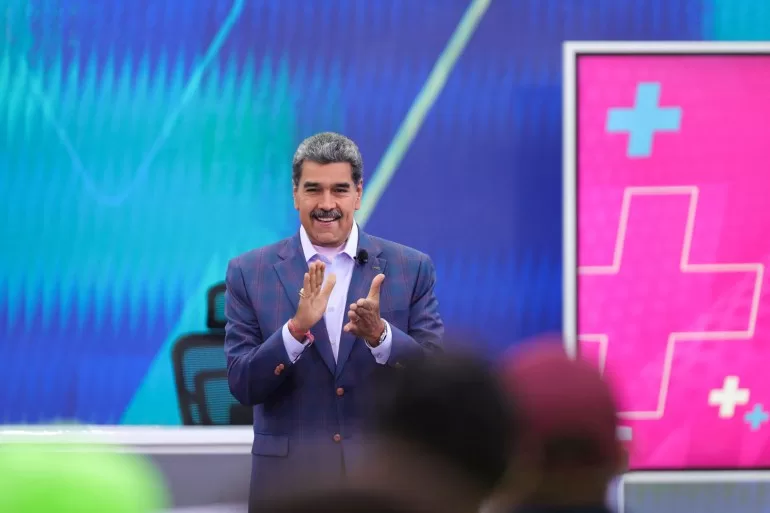Foreign leaders, including in the United States and Brazil, have reacted with alarm and warnings after Venezuela issued an arrest warrant for opposition leader Edmundo Gonzalez Urrutia this week.
On Tuesday, Canada joined in the outcry, as the government of President Nicolas Maduro continues to crack down on opposition members after a contested presidential election.
“Canada categorically condemns the arrest warrant issued against Edmundo González by Venezuelan authorities,” Global Affairs Canada wrote on its social media channels.
“Canada urges Venezuelan authorities to stop repressive acts that silence democratic voices and create a climate of fear.”
Maduro’s government declared him the winner of the July 28 presidential election, with nearly 52 percent of the vote. But unlike in past elections, it did not release vote tallies to back up that claim.
The opposition, which rallied behind Gonzalez as its candidate, has since released records that it says show the former diplomat won instead.
The arrest warrant against Gonzalez came after the government summoned the opposition candidate to testify as part of an investigation into the opposition’s claims of victory.
Attorney General Tarek William Saab also accused Gonzalez and his allies of instigating disobedience and insurrection.
On Monday, when Gonzalez failed to comply with the summons, Saab issued a warrant for his arrest.

In the day since, international leaders have condemned the move, even in countries that have otherwise maintained friendly relations with the Maduro government.
Speaking with the news outlet Reuters on Tuesday, Celso Amorim, a foreign policy adviser to Brazilian President Luiz Inacio Lula da Silva, sharpened Brazil’s criticism of Caracas.
“There is no denying that there is an authoritarian escalation in Venezuela,” said Amorim.
Brazil is among the countries that have taken steps to expand bilateral relations with Venezuela in recent years.
Still, Amorim warned that Gonzalez’s detention would be viewed as a “political arrest” in Brazil, were it to unfold. He also added that relations have become strained.
“We do not feel openness to dialogue. There is a very strong reaction to any comment,” he told Reuters.
The US, meanwhile, has long been hostile to Maduro, sanctioning his government for alleged democratic backsliding. In a news briefing on Tuesday, the government of US President Joe Biden repeated its condemnations in light of the arrest warrant.
“We do condemn the arrest warrant for Edmundo Gonzalez for allegedly inciting violence,” State Department spokesperson Matthew Miller told reporters.
“This arbitrary and politically motivated action demonstrates the extraordinary lengths to which Nicolas Maduro will go to try to maintain power, following his attempt to steal the July 28 presidential election.”
Miller pointed out that other countries in the region, previously on more amicable terms with Venezuela, have also become increasingly critical.
“I would note it’s not just the United States that’s condemning this arrest warrant,” Miller said. “It’s countries in the region: Argentina, Costa Rica, Guatemala, Paraguay, Peru, the Dominican Republic and Uruguay who have all condemned this unjustified arrest warrant.”
Venezuela’s opposition has maintained that they handily won the election – consistent with pre-election polling that showed Maduro losing by an insurmountable margin.
However, the government has responded to protests with a deadly crackdown and widespread arrests.
The human rights group Foro Penal estimates that nearly 1,581 people have been arrested since July 28, including high-ranking members of the opposition. An estimated 23 people have been killed in the protests, according to another group, Monitor de Victimas.

Gonzalez himself has gone into hiding in the weeks since the election. Speaking outside Gonzalez’s house in Caracas on Tuesday, opposition lawyer Jose Vicente Haro told reporters the candidate had not sought asylum abroad.
Calls for the Maduro government to release voter tallies to prove his victory have thus far gone unheeded.
White House national security spokesperson John Kirby said earlier this week that the US was considering “a range of options to demonstrate to Mr Maduro and his representatives that their actions in Venezuela will have consequences”.
On Monday, the Biden administration seized a $13m aeroplane in the Dominican Republic that had allegedly been bought for Maduro in violation of economic sanctions.
